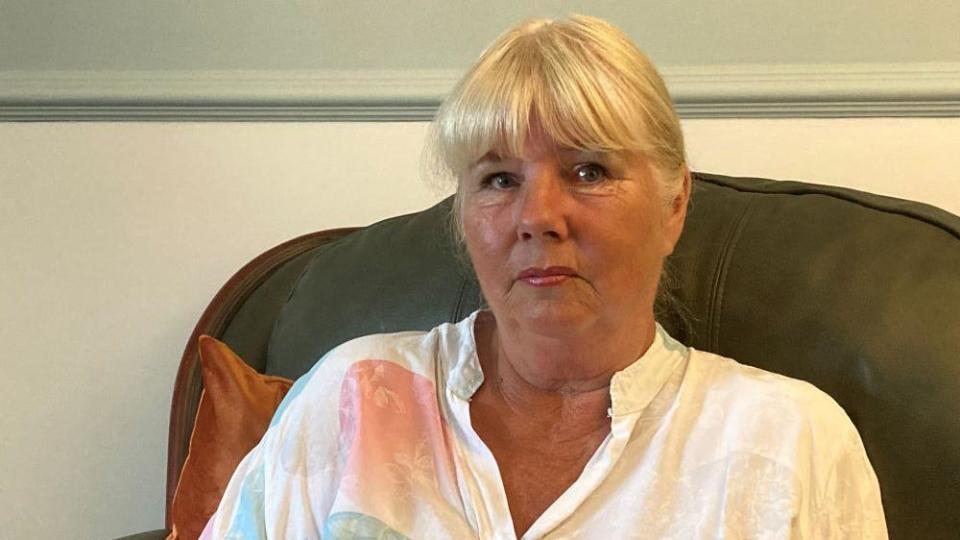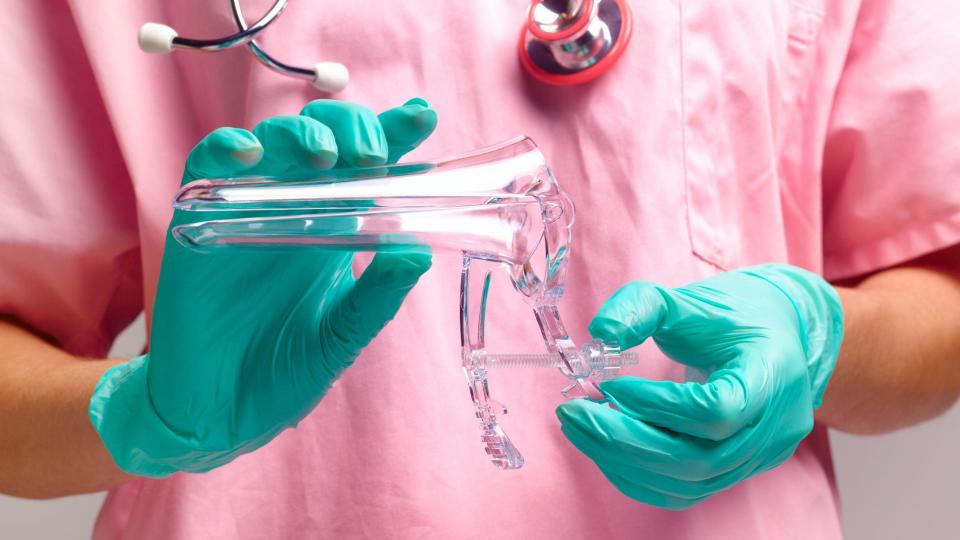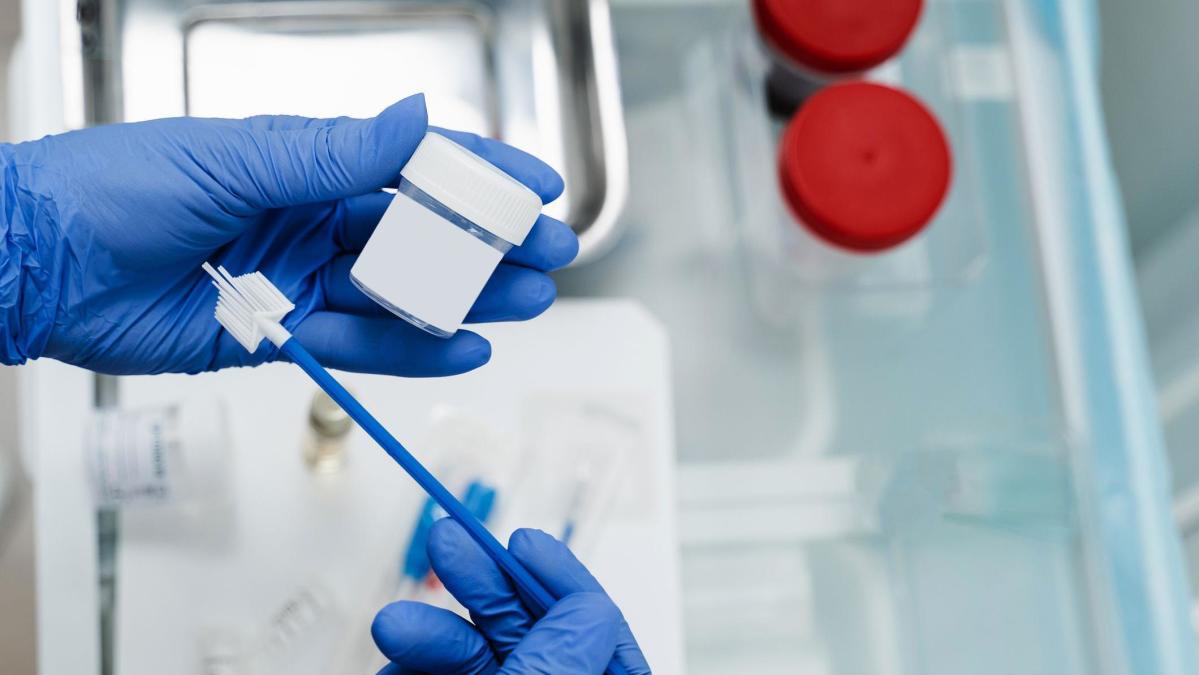A small number of biomedical scientists are being investigated following fitness to practise concerns relating to cervical screening in the Southern Trust, BBC News NI understands.
In October 2023, it emerged smear tests of more than 17,000 women in the trust would be re-checked as part of a review dating back to 2008.
It is understood that some of the women affected have since referred the matter to the Health and Care Professions Council (HCPC) which investigates concerns about the practice of a professional on its register.
In a statement, the HCPC said it does not share details or information about individual cases where there are ongoing investigations and legal processes.
Concerns can be raised by anyone: members of the public, patients / service users, employers, or other health and care professionals.
‘Afraid, fragile and angry’
Stella McLoughlin from Newry, who is one of the 17,500 women affected by the re-check, said the review process has left her feeling “very afraid, fragile, and angry”.
Following news that other women in her position have referred the matter to the HCPC, she said there needs to be an investigation.
“I don’t know why they’re calling it a review because to me this is a scandal. This has affected so many women,” she said.
The 69-year-old had what should have been her last smear test in 2019.

She said she was “really delighted” when, back then, she was told the results were clear.
Once women turn 65, they usually stop being invited for screening because it is very unlikely that they will get cervical cancer.
They are only invited again if a recent test was abnormal.
Stella said she was “enjoying life thinking everything was fine”.
That changed when she received a letter from the Southern Health Trust (SHT) on 24 June on the day she returned from holiday.
“I nearly died when I opened it,” she said.
“I was expecting good news.”
‘I feel cheated’
The letter said her last smear test, which had been reported as negative, on review now reported “low grade cell changes”.
It went on to state that most low grade changes return to normal over time but a “small proportion” can progress.
Stella said the fact it had been five years since her last smear test “really alarmed” her and she now felt “cheated”.
“I feel cheated because I was given a result five years ago that I trusted,” she said.
The SHT letter encouraged Stella to attend for another smear test, which was booked for 13 July, but then cancelled.
The trust said this was “due to reduced staffing levels” over the 12 July bank holiday period.
Stella was not happy when she was offered a rescheduled appointment for the middle of August, as it was “too far away”.
She got an appointment on 6 July and now must wait up to six weeks for the result.


The trust said it has reviewed 97% of smear tests.
It had aimed to have all slides reviewed by the end of June, but said they are “currently on track” to complete them by the end of July.
The timeline for anyone who needs a repeat smear has also been delayed by several weeks until mid-September.
The trust said this was revised to account for annual leave and due to the impact of the implementation of Encompass in the Belfast Trust, “both of which incur system downtime”.
While full results will not be available until the review is complete, the trust said the “vast majority of previous smear results are unchanged and have been confirmed as normal”.
Abnormalities to be expected
It said in a review of this size, it is expected that some abnormalities will be identified.
To date “some low-grade abnormalities and a very small number (less than 5) of higher-grade abnormalities have been found”.
The trust is keen to stress that this “does not mean that cancer has been found”, but rather these women need “further investigation and management as required”.
It added that once the review is complete, findings will be analysed, and an outcomes report will be published in due course.
The trust said it has contacted the HCPC to inform it of the ongoing cervical cytology review.
It said, “at this time, no screeners have been referred to the HCPC” by them and that there is “currently insufficient information on which to base such a referral” as the “precautionary review is ongoing”.
‘Failed the women of Northern Ireland’
Dr Gabriel Scally, who led the review into cervical screening in the Republic of Ireland, said “it is a significant step” that the HCPC is carrying out an investigation.
“It’s particularly significant, obviously for the individuals whose performance is being reviewed at that level, at a national level,” he said.
“I think it’s very sad that it’s come to this because the saga of cervical screening and the way it has really failed the women of Northern Ireland.
“It’s about much, much more than just a couple of individual whose screening performance in terms of looking at the slides is under question.”


Dr Scally’s view is that this should only be the “beginning of a really thorough review of what went wrong with cervical screening and what is still wrong with cervical screening in Northern Ireland”.
He said the current review is taking “far too long” and that “unnecessary” and “avoidable delays” are not good in a screening system.
Dr Scally feels that there shouldn’t just be a look at the screeners but at “why poor performance was tolerated in Northern Ireland, why they didn’t implement HPV and why we’ve still got a number of very small and potentially highly ineffective laboratories.”
In December 2023, Northern Ireland introduced primary HPV cervical screening.
It checks for an infection called human papillomavirus (HPV) – the cause of most cervical cancers.
This newer HPV test is regarded as more accurate at detecting who is a higher risk of developing cervical cancer.

